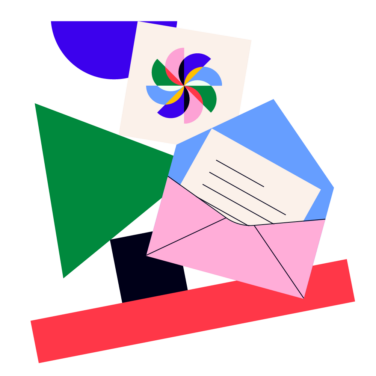If you're deeply immersed in the digital marketing world, terms like B2B and B2C shouldn't be foreign to you. However, understanding their respective marketing strategies might not be as straightforward. In fact, the world of B2B marketing has undergone quite a remarkable transformation, and looking at average marketing expenses there is no stopping its growth.
According to Forrester’s 2022 B2B Marketing Survey, it was revealed that 51% of enterprise companies that grew annual revenue by over 20% in 2021 invested 6.1% to 9% in B2B marketing.
As the scope of B2B marketing continues to grow, marketing teams must stay up to date on emerging strategies and best practices. In this article, we will explore the current state of B2B marketing, examine its differences from B2C marketing, trace its evolution, delve into effective strategies, and discuss the scope that ranges from demand generation to customer experience.
What Is B2B Marketing?
B2B, or business-to-business marketing, refers to marketing efforts that target other businesses or organizations. Unlike business-to-consumer (B2C) marketing which targets individual consumers, B2B marketing focuses on building relationships with other companies with the intent of promoting a company’s products or services to potential B2B decision makers who will purchase and use the products or services.
B2B marketing involves various strategies and techniques to effectively reach and engage with target businesses, such as utilizing targeted advertising campaigns, networking and relationship-building activities, creating valuable content, and delivering personalized messaging and offers.
B2B Vs B2C Marketing: The Difference
While both B2B and B2C marketing aims to drive sales and lead generation, their approaches and target audiences differ significantly. The target audience of B2B marketing consists of businesses, organizations, or institutions, rather than everyday consumers. The purchase decision process is much longer and more complex, as B2B marketing involves multiple stakeholders, decision-makers, and providers. On the other hand, B2C marketing often focuses on emotional appeal and impulsive buying behavior.
Looking at messaging, B2B marketing is more factual, data-driven, and focused on industry-specific jargon to demonstrate product or service value, while addressing business needs and pain points. Whereas B2C marketing often places emphasis on the benefits, lifestyle, and emotional satisfaction associated with the product or service.
The tactics and methods also differ. In B2B marketing, you’ll use a combination of traditional and digital tactics that are deeply targeted, such as hosting professional networking events or delivering specialized content marketing. The customization of account-based marketing tactics also fall in this category. In B2C marketing, it tends to lean more on mass advertising, working with social media platforms, or influencers to reach a broader audience.
The Evolution Of B2B Marketing
Over the years, B2B marketing has undergone changes and evolved in response to advancements in technology, resulting in the emergence of new b2b sales and marketing channels. Back in the day, B2B marketing was done via traditional methods, such as cold-calling potential prospects, attending trade shows to network, and using print advertising. However, now with today’s digital transformation, the scope of B2B marketing has broadened, opening new opportunities and challenges for businesses.
One notable evolution in B2B marketing is the increased emphasis on creating personalized and targeted experiences for potential buyers. Advances in data analytics and the enablement of customer relationship management (CRM) systems have allowed businesses to gather and analyze vast amounts of customer data, allowing marketers to create highly specialized marketing campaigns. Modern B2B marketers now have access to sophisticated segmentation techniques, enabling them to tailor their messaging, b2b content, and offers to specific industries, job roles, or company sizes.
Another aspect of the evolution of B2B marketing is the shift towards inbound marketing strategies. Rather than solely relying on outbound approaches like cold-calling, B2B marketers now concentrate on creating valuable and educational b2b content that establishes their expertise, solves customer issues, and drives organic traffic. Content marketing, social media engagement, search engine optimization, and email marketing play significant roles in building brand awareness, nurturing leads, and fostering long-term relationships.
The evolution of technology has also led to the rise of e-commerce platforms and digital marketplaces, transforming B2B purchasing processes and behavior. Nowadays, B2B buyers expect the same convenience, personalization, and seamless online experiences they encounter as consumers. As a result, success in B2B marketing relies on being more targeted, personalized, and digital-oriented.
The scope of B2B marketing has also expanded to include account-based marketing (ABM), which concentrates on targeting specific accounts or companies rather than individual leads.
An ABM strategy involves personalized, highly targeted campaigns that align sales and marketing efforts to deliver a tailored experience to key accounts. As you can see in some great examples of account-based marketing, this approach emphasizes building solid relationships and providing personalized solutions to individual businesses' unique challenges and goals.
Effective B2B Marketing Strategies
Whether you are working for a startup, a small business or a corporation, there are a variety of B2B inbound marketing strategies you can implement, from content marketing, to email marketing, and SMS marketing. These strategies offer businesses a variety of avenues to reach and engage their target audience effectively. By incorporating a mix of these strategies into your overall marketing plan, your B2B business can connect with prospects, build relationships, and drive conversions in a more effective way.
Let’s go over some of these marketing activities and look at how certain B2B SaaS companies implement them:
Content Marketing
Content marketing is a highly effective B2B marketing strategy that involves creating and sharing valuable, informative, and engaging content that not only attracts but nurtures target buyers down the sales cycle. When providing relevant information and addressing business pain points, you can position your brand as the top industry thought leader within the space, ultimately building trust with prospecting clients and turning them into quality leads.
Consider creating blog posts, infographics, whitepapers, and case studies that discuss best practices around your business offering or industry, so that you can showcase your expertise and offer truly valuable insights to your target audience.
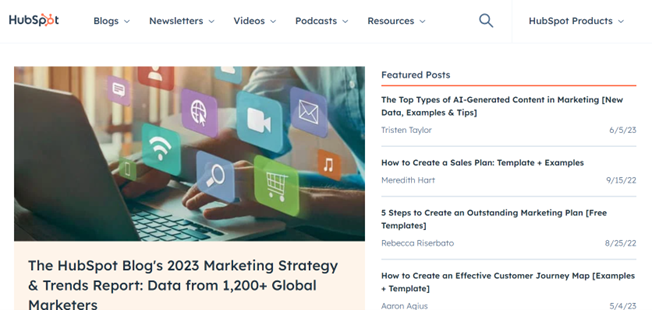
For example, the B2B SaaS company HubSpot is an absolute master of content marketing strategy. Their blog has daily frequent visitors, and they also create ebooks, podcasts, webinars, and other types of content that are highly valuable to their target audience of marketers.
Social Media Marketing
Utilizing social media marketing is another powerful avenue for B2B companies, enabling the direct connection with a target audience that helps to build brand awareness and encourage engaging conversations. By being active on platforms like LinkedIn, businesses can share industry updates, thought leadership content, customer testimonials, and product updates. You can also leverage LinkedIn to engage with business professionals, share relevant content about industry trends and participate in industry groups and discussion.
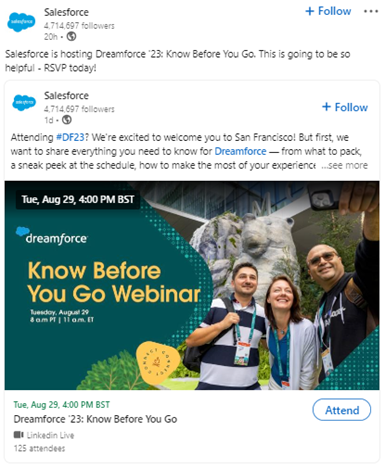

A good example of a B2B SaaS company using social media well on LinkedIn is Salesforce. Their LinkedIn Company Page shares company news, culture spotlights, CSR efforts to humanize the brand, and helpful webinars to attract potential new prospects.
Email Marketing
Of course, b2b email marketing remains an integral part of the B2B marketing toolkit, as it allows businesses to deliver personalized, targeted content directly to their prospects' inboxes. B2B companies can use segmented email lists to provide relevant information, product updates, industry insights, and exclusive offers tailored to prospecting clients. When using email marketing, it’s best practice to send targeted email campaigns to different segments of your subscriber list, ensuring that you showcase your business features and benefits to the right stakeholder. You can also use email to offer free trials or limited-time discounts to drive conversions.
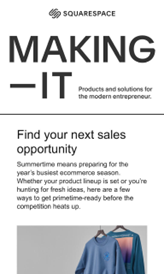
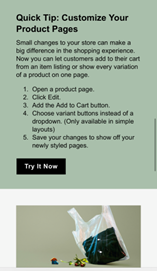
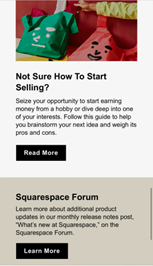
Squarespace uses email marketing by sending a relevant and helpful newsletter called “Making It” which speaks about new features, and design trends, along with top tips on how to use their product more effectively. The newsletter also features inspiring and motivating stories about creative entrepreneurs who are using Squarespace to build their businesses, which helps to show potential customers what's possible with Squarespace.
Messenger Marketing
Messenger marketing, particularly through platforms like Facebook Messenger, has gained traction over the years. It involves using chatbots or automated messaging to engage with prospects, answer their queries, and guide them through the sales funnel. B2B companies can use messenger marketing to provide instant customer support, deliver personalized content, and qualify leads. Consider using a chatbot on your website to engage with visitors, answer FAQs, and offer demos or consultations.
SMS Marketing
Although SMS marketing is more common in B2C marketing, it can also be an effective strategy for B2B companies looking to reach decision-makers on their mobile devices. Studies have shown that SMS messages have a click-through rate of around 19%, compared to an email click-through rate of around 3%. SMS messages are more likely to be seen as urgent.
SMS marketing software can also be used to send timely notifications to customers about important events, such as account expirations, password resets, and software updates. This can help keep customer profiles informed and engaged. SMS apps can also send product updates to customers, such as new features, bug fixes, and security updates.
The Scope Of B2B Marketing
Today, B2B marketers focus on various areas to drive growth and success, focusing their efforts on demand generation, content marketing, customer experience, and artificial intelligence (AI).
Demand Generation
Demand generation is all about emphasizing the creation and nurturing of demand for products and services. This stage is meant to drive interest and intent to buy among potential B2B customers, as the goal is to generate qualified sales leads. To do so successfully, B2B marketers leverage data analytics, predictive modeling, and automation tools to help identify the target audience’s needs and preferences, formulating a buyer persona, in order to deliver personalized experiences. By utilizing a combination of SEO, paid ads, email marketing, webinars, and marketing automation, B2B companies can generate high-quality leads and improve conversion rates.
Content Marketing
Content marketing of course is a crucial driver of success in B2B marketing. Though these days, to excel in this field, you must focus on creating highly targeted, interactive, and immersive content experiences. In today’s landscape, it is encouraged to explore emerging formats such as virtual reality (VR), augmented reality (AR), and interactive videos to not only engage but educate or entertain your target market. Many search engines and social platforms rely on content recommendations, enabling marketers to think about how to truly deliver relevant content at the right time.
Customer Experience
Customer experience has also become a top priority in B2B marketing, as businesses realize the impact of exceptional experiences on customer loyalty and advocacy. These days, B2B marketers invest in customer journey mapping, predictive analytics, and automation to enhance the end-to-end customer experience. When integrating touchpoints and ensuring seamless interactions across channels, you can deliver personalized and consistent experiences that differentiate you from competitors.
Artificial Intelligence
Artificial intelligence is revolutionizing B2B marketing as it now offers opportunities for enhanced automation, improved B2B conversion rate optimization, personalization, and data-driven decision-making. Marketers are increasingly leveraging AI-powered tools and platforms to automate repetitive tasks, analyze large datasets, and deliver hyper-personalized experiences. AI will also continue to play a crucial role in chatbots for customer support, predictive analytics for customer segmentation, and streamlining sales and marketing processes. There’s no need to fear it, as long as you know how to use it wisely!
Leading With Value To Demonstrate ROI
Ultimately when it comes to B2B marketing, focus on leading with value and remember that your B2B customers care most about what your business product or service will provide and how it will solve their challenges. Leveraging data-driven metrics, automation, and emerging technologies to drive growth, while delivering personalized experiences, building long-term customer relationships, and staying on top of trends is the magic combo for success.
By embracing these advancements, you can stay ahead of the curve, adapt to evolving buyer expectations, and make the best of your marketing budget. For more insights on how to effectively attract and nurture your B2B customers, subscribe to The CMO Newsletter to receive the latest top tips in your inbox.


